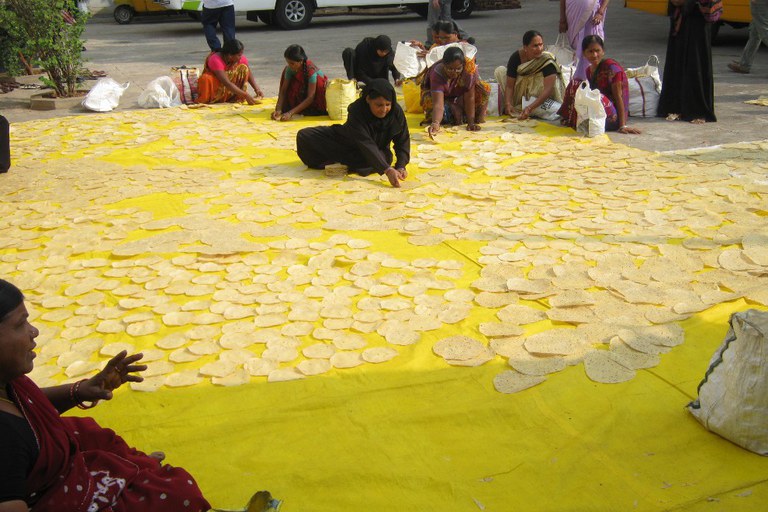Posted: May 25, 2016
The experience and knowledge offered through Food Science 499B, Agriculture and Food Systems of India, will certainly be a highlight of my college career and be an essential point in my career development.

This is a picture from Lijjat Papad. Papad has to be sundried on tarps before the women sort them into stacks for packaging.
I have always had a passion for experiencing other cultures and therefore have had a strong desire to study and travel abroad. The embedded course, Food Science 499B: Agriculture and Food Systems of India, allowed me to experience the culture of India, without having to rearrange my education plans to incorporate an entire semester abroad. I and eight other students traveled to the city of Hyderabad in south-central India, for a week over Thanksgiving break. During the rest of the semester we had multiple guest lectures inform us about the overall social and economic status of India. We also learned how food influences and effects their culture.
The biggest highlight of my time abroad was visiting the Lijjat Papad business to learn about the work they are doing and hear first-hand the impact on some womens' lives. Papad is a crispy, round bread that Indians eat before meals as an appetizer, similar to Americans eating chips. Lijjat Papad provides an opportunity for women in the villages surrounding Hyderabad to earn money, to supplement their husband's income. However, the owners of Lijjat Papad, an elderly couple, were emphatic that the major goal of their business is to empower lower class Indian women and give them confidence to speak up about women's rights.
Another highlight was learning and experiencing the vast differences in cuisine across the country. Every company we visited talked about the need to adapt food products based on the region where they are sold. For example, every variety of papad sold by Lijjat Papad is also designated as either Northern or Southern. We touched on this difference during class, but experiencing it first-hand was delicious! It also an interesting challenge for Food Scientists in India, because one version of a product is not desired nationwide.
A major goal of the course, as students, was to develop a potential product for an Indian market. Learning about India was helpful in some ways, such as providing background about the social dynamics and economic status of the average Indian. However, traveling to India increased the depths of our knowledge and understanding because we were able to experience which aspects of food and food production were most important to Indians. For example, my group developed a dessert product. Traveling to India allowed us to experience the true intensity of sugar and cardamom that Indians desire in their desserts. Before visiting India, we were only able to guess at the appropriate amounts of sugar and spice.
I gained many things from being part of Food Science 499B. Two skills I further developed were problem solving and communication skills. I had to apply and improve my problem solving skills while developing the prototypes of our product development project. We needed many ingredients that are not available at average grocery stores so we had to visit multiple cultural food stores in State College. Problem solving was also required to think of using Chinese dumpling shells instead of rice flour dough, which was too difficult to mold. Traveling to India, as well as visiting the different cultural food stores, improved my cross-cultural communication skills. All of us, as students picked up on different phrases and motions that Indians commonly use in communication. For example, to indicate "yes" Indians bob their head from side-to-side instead of up and down as Americans do. Understanding some colloquial translations from their native language to English was challenging at first. For example, they ask "any doubts?" instead of "do you have any questions?"
I am grateful to everyone who made this opportunity possible through inspiration, teaching, travel planning, and any other details. The experience and knowledge offered through Food Science 499B, Agriculture and Food Systems of India, will certainly be a highlight of my college career and be an essential point in my career development.
Ag Sciences Global
Address
106 Agricultural Administration BuildingUniversity Park, PA 16802
- Email globalag@psu.edu
- Office 814-863-0249
- Fax 814-865-3055
Ag Sciences Global
Address
106 Agricultural Administration BuildingUniversity Park, PA 16802
- Email globalag@psu.edu
- Office 814-863-0249
- Fax 814-865-3055

